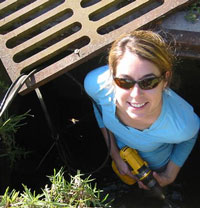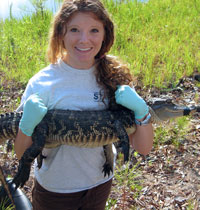Two women described as ‘incredible young researchers’
June 25, 2009

Lisa Vandiver stands hip deep in a storm drain, an important fixture in her doctoral research project on the impact of coastal development on storm water quantity and quality.

ENHS doctoral candidate Michelle Johnston cradles a young alligator, one of her research subjects in a project to analyze the bacterial impact of the reptiles on waters in the state's coastal zone.
Two Arnold School doctoral candidates are recipients of Dean John A. Knauss Marine Policy Fellowships, the most prestigious, nationally competitive fellowship program within the National Oceanic and Atmospheric Administration (NOAA).
Michelle Johnston and Lisa Vandiver are students in the Department of Environmental Health Sciences. Their fellowships provide for stipends to support one-year work experiences in the Executive Branch of government with a federal agency addressing marine issues.
“Johnston and Vandiver are incredible young researchers,” said ENHS Interim Departmental Chair Dr. Dwayne Porter, who is an advisor and committee member for both students.
Johnston expects to finish her doctorate in December. She developed an interest in marine science and endangered species conservation early in life and decided to pursue her undergraduate degree in marine biology at UNC-Wilmington, graduating in 2004.
Looking for an opportunity to continue her studies in the Carolinas, she moved to Columbia where she became a graduate assistant at the Baruch Institute’s Geographic Information Processing Lab. At the same time she also worked at the NOAA Center for Coastal Environmental Health and Biomolecular Research in Charleston.
She earned her master’s degree in 2007 and embarked on her doctoral research program which involves determining if bacterial shedding from American alligators is a concern in water quality degradation throughout the South Carolina’s coastal zone.
Johnston says she expects the Knauss Fellowship to broaden her understanding of marine policy and move her closer to a professional career “where I can continue to bridge the gap between science and management for important coastal resource issues.”
Vandiver earned a bachelor’s degree in marine biology from the College of Charleston in 2001, and then accepted a teaching position. However, she missed field work and, with an unsatisfied yen to become a research scientist, decided a year later to return to the College of Charleston to pursue a master’s degree.
During her master’s studies, she developed an interest in research with the potential to help shape public policy and, on the advice of her advisor, enrolled in the Environmental Health Sciences program at USC in 2005.
Much of her graduate research focus has been the effects of coastal development on storm water quantity and quality, key issues in the rapidly developing coastal regions of the world.
As for her upcoming fellowship, “I have been fortunate to see both my master’s and Ph.D. research influence regional policies. I would like to extend this experience in Washington and gain exposure to the process of developing, implementing, and enforcing national legislation,” she said.



_01.jpg)
_02.jpg)